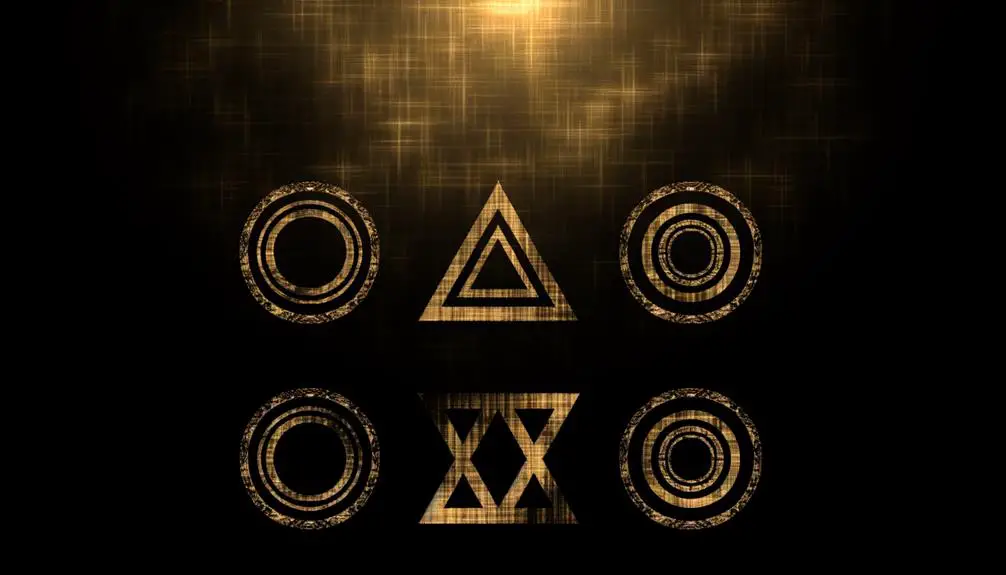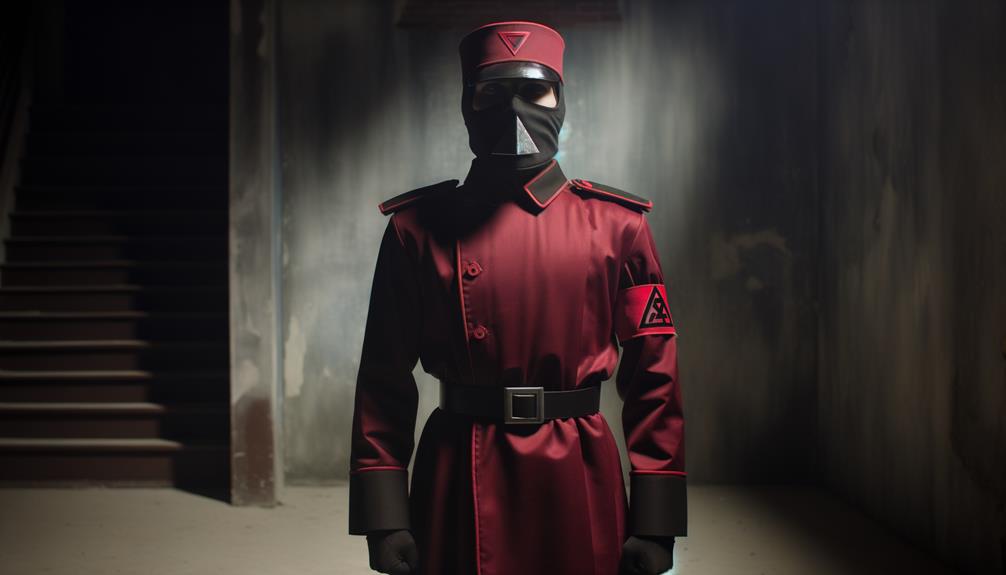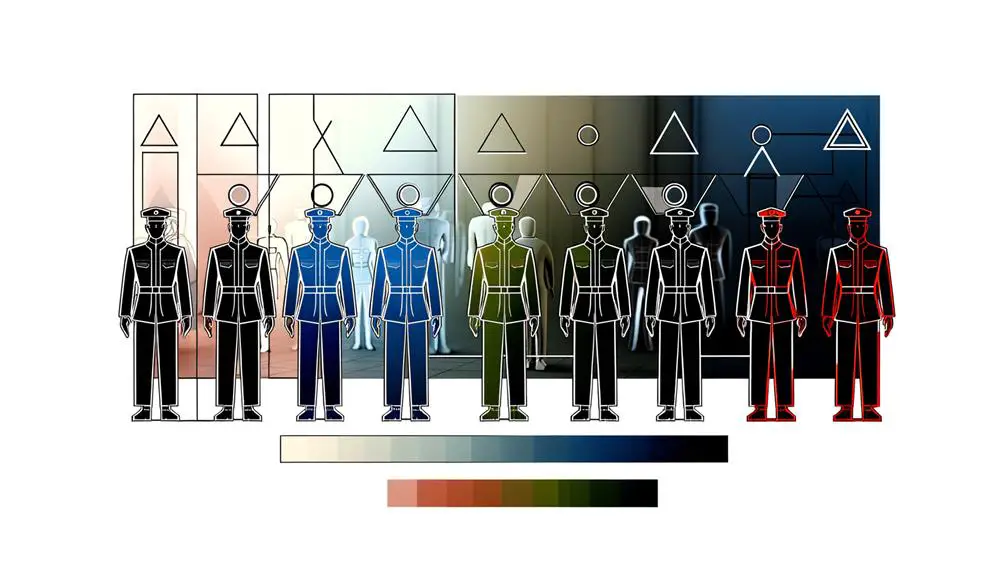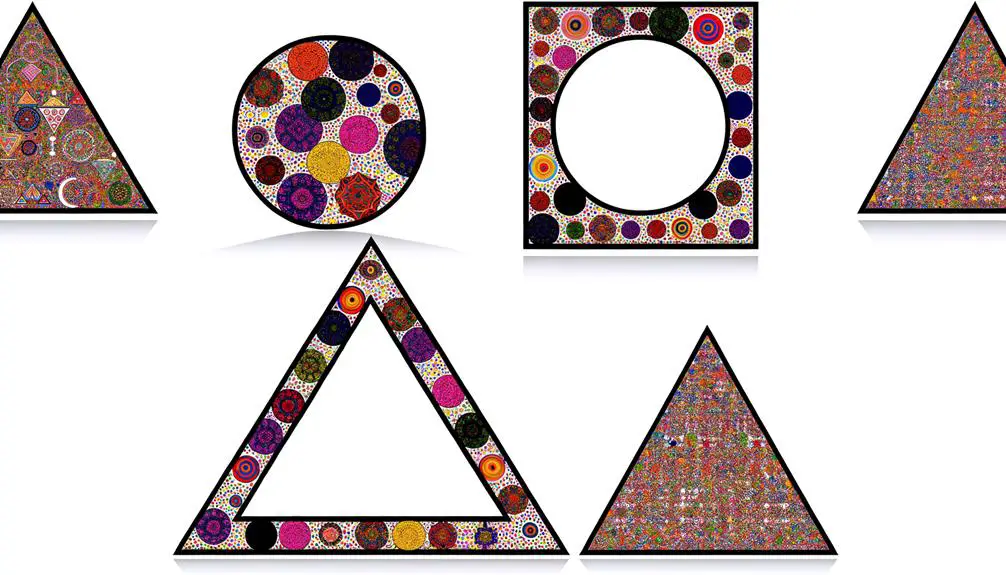What Do Circle Triangle Square Symbols Mean in Squid Game?
In 'Squid Game,' the symbols of circle, triangle, and square represent various hierarchical roles, reflecting significant societal themes. Circles denote the faceless workers devoid of autonomy, illustrating systemic oppression.
Triangles symbolize soldiers who enforce rules with strict discipline, underscoring the ethical dilemmas of authority. Squares represent managers with heightened control and responsibility, signifying power dynamics and social stratification.
These geometric shapes critique the dehumanizing nature of competitive environments and socioeconomic disparities. Through visual storytelling, they highlight issues of power, control, and human dignity.
Exploring this deeper reveals the intricate commentary on societal structures embedded within the show.

Key Takeaways
- Circle represents the lowest tier workers, illustrating lack of agency and economic disparity.
- Triangle signifies soldiers enforcing rules, symbolizing authority, discipline, and ethical dilemmas of power.
- Square denotes managers with significant authority, emphasizing control, power dynamics, and societal inequality.
- Shapes delineate hierarchical roles, highlighting societal stratification and control mechanisms within the narrative.
- Geometric symbols critique socioeconomic disparities, dehumanizing competition, and existential struggles.
Symbolism in Squid Game

Frequently, the symbols in 'Squid Game' serve as profound metaphors for the underlying societal and existential themes explored throughout the series.
The shapes—circle, triangle, and square—are not merely aesthetic choices but represent hierarchical structures and social dynamics pervasive in modern society. Each symbol corresponds to a specific role within the dystopian game, reflecting the rigid stratification and lack of mobility faced by individuals.
This metaphorical framework critiques the real-world socioeconomic disparities and the often dehumanizing nature of capitalist competition. By embedding these symbols within the narrative, 'Squid Game' invites viewers to reflect on the pervasive inequalities and moral compromises inherent in the pursuit of survival and success, resonating deeply with global audiences.
Circle: The Workers
In 'Squid Game,' the circle symbol worn by the workers signifies their foundational yet subordinate role within the hierarchical structure. This visual representation underscores themes of control and subjugation, reflecting broader societal concerns about labor and power dynamics.
Through their uniforms and strictly defined duties, the workers embody the systemic oppression that permeates the narrative.
Uniform and Hierarchy
The circle symbol in 'Squid Game' represents the lowest tier in the show's rigid hierarchy, designating the workers who perform various menial tasks under the watchful eyes of their superiors. Their uniforms, marked with the circle, indicate a lack of agency and autonomy, reflecting their subservient roles.
This symbolic representation underscores the broader societal theme of class stratification and the dehumanizing effects of hierarchical structures. The stark visual distinction between the circles and their superiors fosters an immediate understanding of power dynamics.
Symbolism and Meaning
Embedded within the circle symbol is a profound commentary on societal roles and the inherent lack of autonomy granted to those at the bottom of the hierarchy in 'Squid Game'.
The workers, represented by circles, are depicted as faceless entities, stripped of individuality and subjugated to the whims of the elite. This symbolism underscores a broader critique of systemic oppression and economic disparity, reflecting how lower socioeconomic classes are often compelled to perform menial tasks without recognition or agency.
Role and Duties
Through their role and duties, the workers symbolized by circles in 'Squid Game' illuminate the relentless and dehumanizing labor that sustains the power structures within the game's dystopian society. These masked laborers are stripped of individuality and humanity, reduced to mere cogs in a brutal machine. Their tasks, which range from managing contestants to disposing of bodies, highlight the mechanistic and oppressive nature of the system.
- Enforcement of rules: Ensuring contestants adhere to the game's stringent regulations.
- Logistical support: Handling the daily operations and upkeep of the game's environment.
- Surveillance: Monitoring players to prevent and swiftly address any infractions.
- Disposal and cleanup: Managing the aftermath of the games, including removing deceased participants.
Such roles underscore the broader societal critique embedded within the series.
Triangle: The Soldiers

In 'Squid Game,' the triangle symbol represents the soldiers, who enforce the rules with unwavering authority and precision. These masked enforcers embody strict discipline and operational efficiency, illustrating the show's depiction of a regimented and authoritarian hierarchy.
Symbolically, the triangle signifies stability and strength, reflecting the soldiers' role in maintaining order amidst chaos. Their presence underscores the dehumanizing nature of absolute power, as they are stripped of individuality and act solely on command, emphasizing the loss of personal agency.
Societally, the triangle soldiers mirror real-world systems where rigid structures often prioritize control over compassion, raising critical questions about the ethical implications of such governance. This portrayal contributes to the show's broader commentary on power dynamics and human dignity.
Square: The Managers
In 'Squid Game,' the square symbol represents the managers, who hold significant authority and responsibility within the game's hierarchy. Their distinctive uniforms, marked by the square, symbolize their elevated status and control over the soldiers and contestants.
This hierarchical distinction not only underscores the rigid power dynamics at play but also reflects broader societal themes of inequality and structured dominance.
Authority and Responsibility
Square symbols in 'Squid Game' represent the managers who hold significant authority and responsibility within the game's hierarchical structure. These individuals are tasked with overseeing the smooth execution of the deadly games, making certain that rules are strictly followed and that order is maintained. Their roles are pivotal for the functioning of the dystopian environment, reflecting a microcosm of societal power dynamics.
Key responsibilities of square-symbol managers include:
- Rule Enforcement: Guarantee all participants and staff adhere to the established guidelines.
- Decision Making: Make critical decisions that impact the outcome of the games.
- Resource Allocation: Manage and allocate resources efficiently to sustain the game's operations.
- Crisis Management: Handle emergencies and unexpected situations promptly.
These roles symbolize the weight of authority and the complexities of governance in extreme conditions.
Distinctive Uniform Features
The managers' uniforms, distinguished by their square symbols, serve as a visual representation of their elevated status and control within the game's hierarchy. These square-marked uniforms not only signify authority but also provide clarity in the chain of command, essential for the orderly conduct of the deadly games. Symbolically, the square represents balance and stability, underscoring the managerial roles in maintaining order. Contextually, this sartorial choice reflects how societies often use visual markers to establish and enforce social structures.
| Feature | Significance |
|---|---|
| Square Symbol | Denotes high rank and managerial authority |
| Uniform Color | Enhances visibility and recognition |
| Functional Design | Practical for overseeing and managing tasks |
In essence, the square symbol and its associated uniform elements reinforce the themes of control, hierarchy, and societal order inherent in the narrative.
Hierarchical Structure

Within the context of Squid Game, the shapes of the circle, triangle, and square serve as visual representations of the show's rigid hierarchical structure. These symbols delineate roles and authority among the masked guards, emphasizing the social stratification essential to the narrative. The hierarchy is clearly defined:
- Circle: Represents the lowest rank, typically performing menial tasks.
- Triangle: Indicates mid-level guards tasked with enforcement and surveillance.
- Square: Denotes the highest-ranking officials, overseeing operations and communicating directly with leadership.
- Hierarchy: These distinctions highlight societal power dynamics and control mechanisms.
Visual Impact
In Squid Game, the visual impact of the circle, triangle, and square symbols is profound, effectively communicating the series' underlying themes of power, control, and societal hierarchy. These geometric shapes are not merely aesthetic choices but serve as potent visual metaphors for the rigid socio-economic structures within the game. The stark simplicity of the symbols evokes a sense of order and discipline, reflecting the dehumanizing nature of the competition.
| Symbol | Emotional Response |
|---|---|
| Circle | Helplessness, Obedience |
| Triangle | Conflict, Aspiration |
| Square | Authority, Control |
Cultural Significance

Cultural symbolism embedded in the circle, triangle, and square shapes within Squid Game resonates deeply with traditional Korean beliefs, societal structures, and historical hierarchies. These geometric forms are not merely aesthetic choices but are rich in cultural significance:
- Circle: Represents unity, continuity, and the cyclical nature of life, reflecting traditional Korean views on harmony.
- Triangle: Symbolizes strength, stability, and hierarchy, often associated with societal stratification and power dynamics.
- Square: Emphasizes order, discipline, and rationality, underpinning the rigid structures within Korean society.
- Collective Meaning: Together, these shapes encapsulate the intricate interplay between individual roles and societal expectations, mirroring the complex social fabric.
This symbolic interpretation provides deeper contextual understanding and highlights the societal impact of these symbols within the narrative.
Hidden Messages
The geometric shapes in Squid Game convey hidden messages that underscore themes of control, societal pressure, and existential struggle. Each shape—circle, triangle, and square—represents different aspects of the hierarchical structure within the game and society. Circles symbolize the workers, reflecting the monotony and lack of individuality. Triangles represent the soldiers, signifying aggression and enforcement. Squares denote the managers, embodying authority and oversight. This layered symbolism serves as a critique of societal hierarchies and the dehumanizing effects of capitalist structures.
| Shape | Symbolic Interpretation |
|---|---|
| Circle | Workers, monotony, lack of individuality |
| Triangle | Soldiers, aggression, enforcement |
| Square | Managers, authority, oversight |
Understanding these symbols deepens the viewer's grasp of the show's societal commentary.
Conclusion
In 'Squid Game,' the circle, triangle, and square symbols go beyond mere shapes, embodying a carefully structured hierarchy that governs the chilling world of the game.
The workers, soldiers, and managers each play vital roles, their geometrical insignias serving as visual cues to their authority and function.
As viewers explore further, the unsettling realization emerges: these symbols reflect broader societal constructs and power dynamics, leaving one to ponder the hidden messages and unsettling truths lurking beneath their surface.






